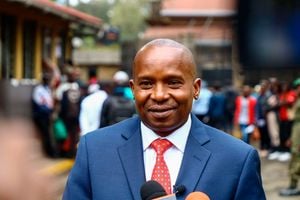The future Mogadishu

A construction site in Mogadishu and, below, a model of the future city in the Mayor’s office. PHOTO I FILE
What you need to know:
- Mayor Mohamed Ahmed Noor envisions the Mogadishu of the future: elegant buildings, heroic statues, clean streets, green trees, and a busy airport
She made me rather jealous, enthusing as she did about her last week’s trip to Mogadishu. How she was let loose beyond the airport and into the town. How she stayed in an ordinary hotel and not in one of those UN-type, blast-protected, compounds.
It’s Christine, my colleague. When we went together to Mogadishu a few months ago we had to hold all our meetings in the airport. And we spent our nights within the sandbagged walls and under the sandbagged roofs of the Amisom facility.
Distant view
Mind you, we were able to take walks along the Amisom-guarded stretch of beach, in the company of a few jogging Burundian or Ugandan soldiers. But the real Mogadishu town remained as distant a view as it was from the air, as we flew in and out.
But, this time, Christine was able to stay at the Peace Hotel in downtown Wadajir District, dining on the terrace cooled by sea breezes – even indulging herself one evening with the hotel’s lobster special.
She was driven through the town for an interview with Mohamed Ahmed Noor, one-time owner of an Internet cafe in London’s Islington but, since 2010, the remarkable – and so far very successful – Mayor of Mogadishu.
But let me qualify all this somewhat. The terrace at the Peace Hotel is protected by a high wall; though you can feel the breeze, you can’t see the sea.
She could, though, hear the bursts of gunfire at fairly regular intervals throughout the day. She was advised not to present herself as a target on the roof. The hotel’s peace was somewhat relative.
And the drive to the Mayor’s offices was in a closed car, with seven armed guards in a pick-up truck in front, and another seven armed guards in a pick-up truck behind. They moved very fast, Christine said.
Despite the speed, Christine was able to see a good deal of the city.
“I was amazed at how alive the place is,” she said. “There are so many people on the streets. Women have opened kiosks and are selling the basics like rice and sugar and soap. Men are sitting and chatting in the tea shops ...
“I was surprised at the fine buildings – many of them Arabic in style. Yes, they are pock-marked with bullet holes now; but Mogadishu must have been a very beautiful city. And the Mayor’s office is splendid – very Italian, with its marble floors and ornate staircase.”
He sounds like a great character, the Mayor. A short time after being appointed Mayor a couple of years ago, he gave an interview with the BBC in which he said that he had sat his family down and warned them that he might not be coming back to London.
“I explained the dangers of the job: that I may be killed, and that one day they may hear in the news that the Mayor of Mogadishu has been assassinated – or killed in an explosion.”
Improving security
Now, he must be thinking that he made the right decision to swap the Internet café for the Mayor’s parlour. He has good reason to believe he is changing quite a few things.
He has played his part in improving security in the city; he has promoted a garbage collection programme, erected streetlights, ensured a round-the-clock power supply, and sacked a number of corrupt officials. He has even moved against reckless motorists – fining those who drive without lights, occupy the wrong lanes, or carry excessive loads.
Elegant buildings
His optimism has not waned. In his compound, there are huge posters like the one shown above that envision the Mogadishu of the future: elegant buildings, heroic statues, clean streets, green trees, and a busy airport.
As Christine could see, the rebuilding is well under way – a good deal of it being done by Somalia’s new friends, the Turks.
If anything, Mohamed Noor’s confidence seems to have grown: “The days of meetings in the airport are over. If anyone wants to talk with me, they can come to my office.” And that is what Christine did.
John Fox is Managing Director of iDC




